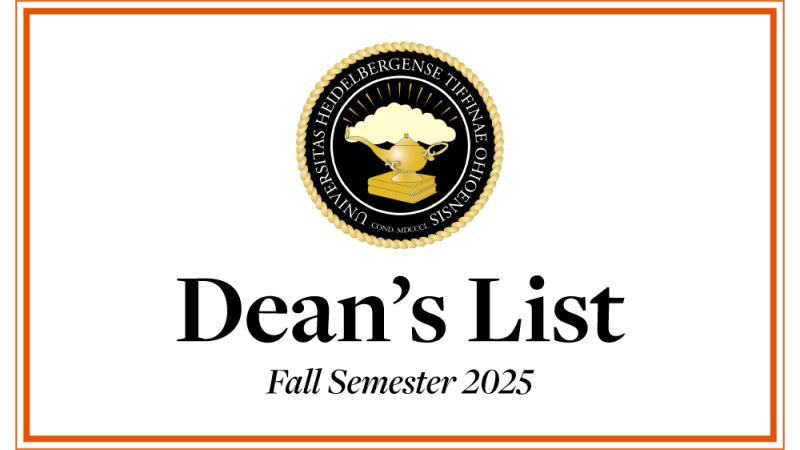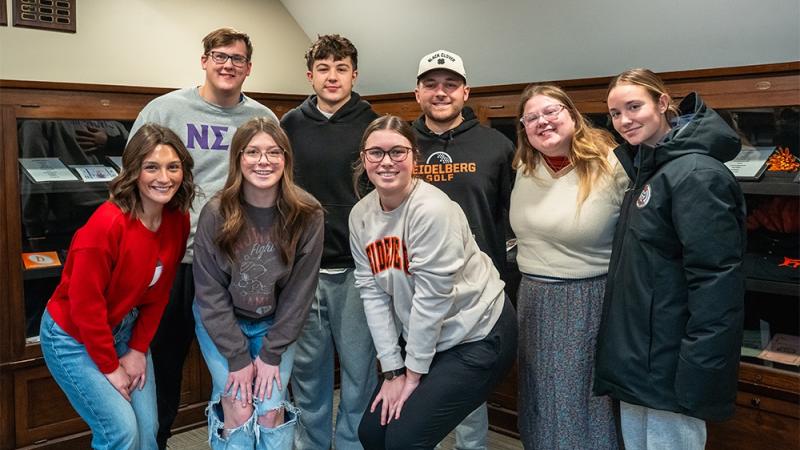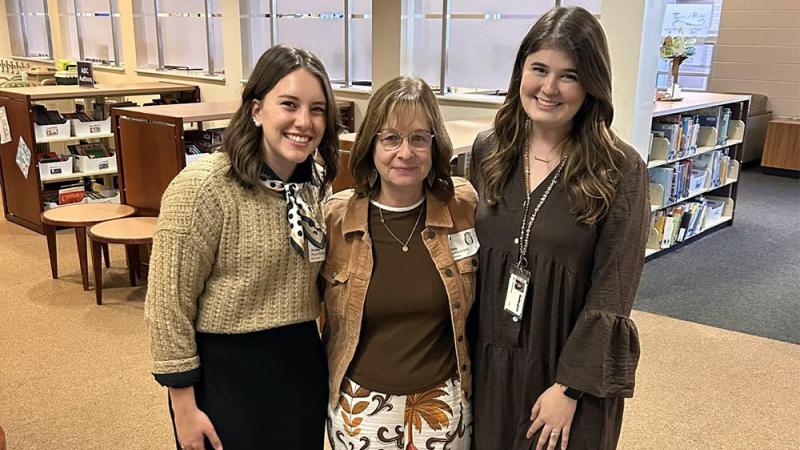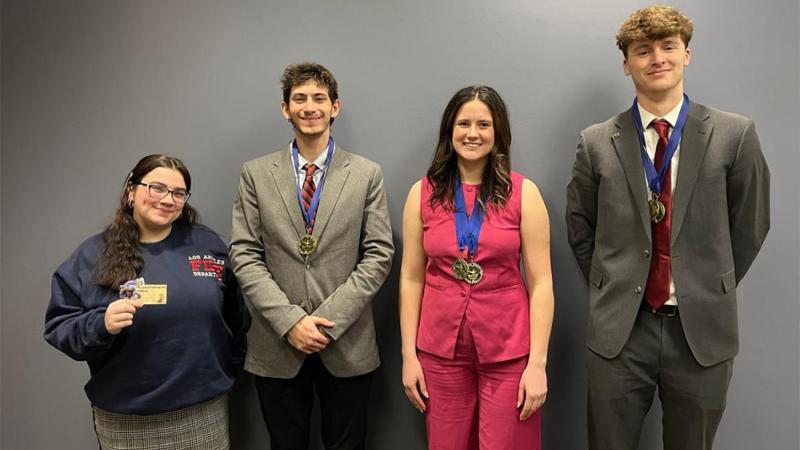Minds@Work on display at annual Student Research Conference
Each spring for the past 28 years, Heidelberg hosts the Minds@Work Student Research Conference. It’s a great way for students to dig deep into topics they’re passionate about and practice their research and presentation skills. This year’s conference was held primarily virtually on Tuesday, April 13.
This year featured 51 presentations and 11 posters, displayed in Seiberling Gymnasium. We were pleased to welcome Dr. Benjamin Pugno, associate professor of humanities at Columbus State Community College, who shared the timely keynote address, “Fear, Blame, Isolation, and Sanitation: Public Response to Epidemics.”
In the keynote, Dr. Pugno looked at epidemics through history and responses to them that were often shaped by human behavior and cultural norms. When a society is in the midst of a pandemic, there are heightened senses surrounding them, He said. “And we see some very consistent themes when it comes to public responses.”
“Epidemics tend to be very different. They tend to come out of nowhere and they elicit responses that are more instinctual,” Dr. Pugno said.
Those responses generally are based around fear of the unknown, who’s at fault (blame) and what happens to those affected (isolation). These common themes can be found in examples of pandemics through the centuries, he said.
Through history – from the plague of ancient Greece to HIV / AIDS in the late ‘70s, ‘80s and beyond to the current COVID-19 pandemic, these themes “should be recognizable to you.”
With COVID-19, all the components are present: the original aspect of fear, the blame put on China, isolation of people who become ill, emphasis on sanitizing. “These can all be related to long-standing traditions,” Dr. Pugno said.
So what’s the underlying takeaway? Epidemics are unique in the history of medicine and we often don’t react rationally but instead with human instincts. But there might be a way to curtail those instincts, Dr. Pugno said.
“First, we need to make sure people do things on a regular basis so that epidemics don’t start. We don’t do those things, but maybe we should start,” he said, noting that changing human behavior is an important step. Greater understanding of how we have dealt with epidemics in the past and better ways to disseminate information also would be effective.
Congratulations to this year’s presenters
Listed here are students who gave presentations or participated in the poster session at this year’s conference:
James Urwin and Jessica Rohrbach
Community Prevention of Adolescent Substance Abuse in the Time of COVID-19
Giorgio Ferrerio and Ann Marie Walker
Preventing the Decline of Mental Health of Parents During the Pandemic
Michael Byrne and Kelsey Jakubcin
Caffeine and Its Effects on Reaction Time
Em Swain
Elements of Humor(ism)
Kaitlin Kingman
Mental Health in Student Athletes After Sustaining an Injury in Division III Football
Alexa Hawk
A Test of Social Disorganization Theory: Does Neighborhood Conflict Lead to Poor School Outcomes for Juveniles?
Brook Franz and Olivia Bean
Athletes and Perceived Loneliness During the Covid-19 Pandemic
Taylor Ramsey and Hannah Kilps
The Reporting of Sport-Related Concussions at a Division III Liberal Arts University in Ohio
Katie Bauman
Obstructing Intentions: The Modern Supreme Court Nomination Process
Alexa Hawk
Health Care in Prisons
Emily Bogard and Camren Smith
Emily and Camren’s Internship Experience
Kassidy Mason
Juvenile Incarceration and the Importance of Intervention
Alessandra Piazza
Should Juveniles be Tried as Adults?
Courtney Temple and Madalyn Newby
Minimizing Food Wasting in Rats by Providing Material to Shred
Stacie Nelson
Depression in College Athletes After Sustaining an Injury
Amanda Sharier
The Requirement for Parental Consent Among Adolescent Research Participants
Branden Short
Ethical Concerns Pertaining to Another Lockdown
Jacob Rigsby and Skylar Rogenski
Presentations over Junior Experience
Kaiden Murphy
Perfluorooctanesulfonic acid (PFOS) and Polyfluoroalkyl Substances (PFAS) Bioaccumulation and Biomagnification Through Food Webs and Drinking Water
Andrew Foote
Chronic Wasting Disease (CWD): A Death Sentence for Deer
James Meyer
Examining John Rawls: Justice and Fairness
Trey Ickes
Individual Tax Avoidance vs. Tax Evasion
Alyssa Pecharka
How Tone at the Top Affect Auditors
Jacob Hogrefe
Big Data and Why It is Important to Accountants
Rachel Ensman
Perceptions of Mental Health Treatment
Matallyn Overmyer
Effects on Neuromuscular Control and Performance in Female Collegiate Basketball Players While Wearing an Elbow Compression Sleeve
Benjamin Markovich
Sustainability: What Is It?
Mark Ward
How Robotic Process Automation is Transforming Accounting
Christopher Storrs
Accounting and Cybersecurity
Bailey Croft
The U.S. Government and Cost Accounting
Connor Hickman
How the Revenue Recognition Change Impacted Auditors: From Procedures to Fraud Opportunity
Logan Kittaka and Jacob Rings
Clinical Effectiveness of Reflexive Neuromuscular Stabilization
Devyn Carder
The Perception of CrossFit® and the Underlying Fitness Stigma Between Genders
Paige Allen- Marsh
The Effects of Alcohol Consumption on Maternal Behaviors in Rats
Kristen Means
An Investigation into the Connection Between First Experiences with Mental Health and Later Stigma in Help-Seeking
Kara Carney
The Effects of Different Timed Dynamic Warm-ups on Athletic Performance
Christina Mealwitz
An Analysis of the Awareness of Sickle Cell Trait Testing in NCAA Athletes
Aedan Lang
Reviewing AAV-based Gene Therapies for Hemophilia
Gillian Duer
The Effects of Applied Pesticides on Common Garden Plants
Mercedes Wells
Proposing Solar Energy Solutions at Heidelberg University
Crimson Stuckert
Neurofibromatosis Type One and the Importance of Genetic Counseling
Caira Goldstein
Alpha Psi Omega Grant Writing
Alexa Hawk, Brook Franz, and Kendall Wright
Covid-19, Quarantines and Incarceration: Exploring the Resiliency of Individuals and Families Who Have Experienced Incarceration
Allison Blythe
Ellen Axson Wilson: The Doubly Forgotten First Lady
Alyssa Edmond
War and Dystopia: A Dissection of the Philosophical Connection Between War and Dystopian Narratives
Jess Ballow and Jamie Whitney
Effect of Auditory Stimulus on Balance Using the Lower Quarter Y-Balance Test
Cole Geiser
The Effects of Flexibility Rates of the Upper/ Lower Extremities on the Number of Pain Points in Weightlifters
Autumn Simpson
Meaningful Math: From Number Talks to Growth Mindset
Sarah Zapola
History and Homer’s "The Odyssey"
Allison Fisher
Differentiation in Lesson Planning: A Comparison Between High School and College World History Courses
Kelly Spence
The Impact of Pigouvian Taxes on Carbon Emissions
Emma Baughman
Beyond Brick and Mortar: Exploring the Cultural Significance of Religious Architecture
Kelsey Stanfield
Rinsta or Finsta: Staying Real on Instagram
Morgan Adams
The Indelible Legacy of President Donald Trump
Kayla Mullinax
The Many Futures of German Leadership: How EU Crisis Brought Germany to the Top
Gavin Robison
Democracy’s Fading Light: Hungary’s Shift to Autocracy
Jacob Salogar and Bryce Zeleznik
Stigmas Around Chiropractic Care
Loren Jones
John Steinback and Women: Madonna -- Whore Dichotomy in East of Eden
Emma Baughman
Unholy Matrimony: The Patriarchal Nature of Shakespearean Marriage Making
Sophia Lee
Why Looking at Madness in Shakespearean Plays Can Help Understand Mental Health Problems Caused by Familial Troubles
Fletcher Grey
The Modern Image of Autism: From Rain Man to MUSIC
Amanda Sharier
Science, Psychology and Ethics of “Star Wars: The Clone Wars”




